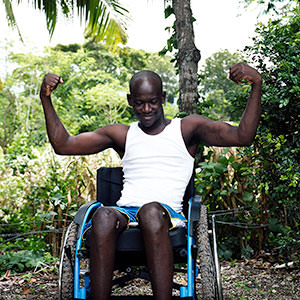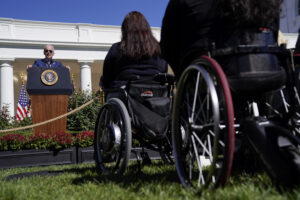How Charity Can Be Deadly to the Disabled
A wheelchair innovator says the charity model does more harm than good for the 55 million paraplegics in the developing world.
By Thomas Hedges, Center for Study of Responsive Law
Ralf Hotchkiss was 18 when a motorcycle accident paralyzed him from the waist down. Fourteen years later, in 1980, he met four teenagers at a rehabilitation center in Nicaragua’s capital, Managua. The teenagers shared one wheelchair and used it to make trips out of the center to go on dates. The chair, designed only for traveling over floors, broke regularly. They would tip it upside down and fix it, and then a few days later it would break again.
Hotchkiss had flown to Managua from San Francisco State University, where he was and still is a faculty expert on wheelchair design. Disabled Nicaraguans had reached out to a group of disabled rights activists, asking for tools and parts to fix broken chairs like the one the four teenagers shared. The relationship between the teenagers and Hotchkiss sparked the creation of Whirlwind Wheelchair International (WWI), an organization that sells high-quality chairs at low costs, provides tools and parts and trains locals to maintain the chairs, which are designed to handle rough roads, uneven dirt and mud. In 2011 WWI sold 15,000 chairs at 10 to 20 percent of their actual cost to people in need. The other 80 to 90 percent was made up through government contracts, both U.S. and foreign.
There are some 55 million paraplegics in the developing world. A few hundred thousand have received wheelchairs from companies like the one Hotchkiss started.
Hotchkiss rails against big companies that sell chairs in large quantities to distributors, which then provide them to disabled people in developing countries at no cost. He says the chairs are poorly made, not custom-fitted and undermine the market for better chairs.
“I don’t like the charity model,” Hotchkiss said in an interview in early September. “It doesn’t work. People who are getting free chairs don’t have the incentive to invest in preventative maintenance if they think another free one might come their way. They don’t feel that they have the right to complain to the manufacturer when the chair has defects.”
Hotchkiss himself uses a custom-fitted RoughRider wheelchair. Much of it he designed himself, and much of the rest of it was designed by partners abroad. The wide front wheels, made of solid rubber, were copied from pushcarts in Zimbabwe. Nicaraguans replaced the square wheel frame with a triangular one, making it stronger while using less material.
For Hotchkiss, quality chairs do not mean luxury. They mean survival for those who use them. Cheap chairs, ones that are not fitted to size or that do not have good padding, increase the risks of pressure sores. Infected sores kill most paraplegics, whose life expectancy after injury drops significantly. A doctor in Kenya told Hotchkiss patients might live only two years after transitioning to a chair.
“During one of our first training sessions in Jamaica, one of the trainees was a skilled mechanic who came from Trinidad,” Hotchkiss recounted. “But when he arrived he had a pressure sore from years of sitting on makeshift devices and hanging out in bed. We knew he was at risk. We trained him. He built a chair. He went back home and not too long after we heard that he had passed away.”
Many paraplegics in the developing world face prejudice. A young man with whom Hotchkiss worked in Kenya had been kicked out of school after he broke his back in the third grade. He enrolled with WWI for a training session at the age of 15, and he almost died from pressure sores halfway through the course. He survived a crisis thanks to a drunk driver rushing him to an emergency room.
Hotchkiss showed me a picture on his camera of a washed-out road and said, “The poorer you get, the more likely you are to live at the end of a path like this.”
“People with disabilities, on average, are the poorest of the poor. They’ll be poorer than any racial minority, any group that’s disadvantaged some other way.”
A high-quality wheelchair costs as little as $200. U.S. spending on the wars in Iraq and Afghanistan averages $3 billion a week, which means that four weeks of spending could provide wheelchairs to every paraplegic in the world, with a billion dollars left over for maintenance.
The four teenagers Hotchkiss met in 1980, along with about 20 other paraplegics, organized a 10-kilometer race toward the end of his visit in Managua. Those in the race were “macho guys trying to show off” and a woman — Telma Ramos, one of the four teenagers. Her old wheelchair was one of “the most horrendous hospital boxes,” Hotchkiss said, laughing. “The wheels were misaligned so they weren’t going in the same direction. … She switched to using the first Whirlwind, which she had redesigned for the race” in an effort to show others what the RoughRider could do. “And she whipped them, she won.” A dozen of the other competitors placed orders for a RoughRider chair after the race.
The riders were all “survivors of the war they had just finished,” Hotchkiss explained. “This was months after the civil war, throwing out [Anastasio] Somoza, one of the more despicable agents of U.S. imperialism in the Western Hemisphere.
“At the same time the U.S. launched our Contra war, where we supported Somoza’s military in Honduras fighting over the border. That really put a halt to progress [for disability rights] in the ’80s.”
The point of the wheelchair race, Hotchkiss explained, “was to say, ‘Listen, OK, fine, the revolution is over and some of us were heroes and some of us are just disabled folks who were here before. Whatever happens next we will be a part of it.’ “
Hotchkiss’ hope is, surprisingly, that Whirlwind Wheelchair International will become obsolete. “I would like to see it become unnecessary,” he said, “—that wheelchairs and other mobility devices become so readily available at reasonable prices throughout the world that we can just back off.”
This article was made possible by the Center for Study of Responsive Law.
Your support matters…Independent journalism is under threat and overshadowed by heavily funded mainstream media.
You can help level the playing field. Become a member.
Your tax-deductible contribution keeps us digging beneath the headlines to give you thought-provoking, investigative reporting and analysis that unearths what's really happening- without compromise.
Give today to support our courageous, independent journalists.






You need to be a supporter to comment.
There are currently no responses to this article.
Be the first to respond.